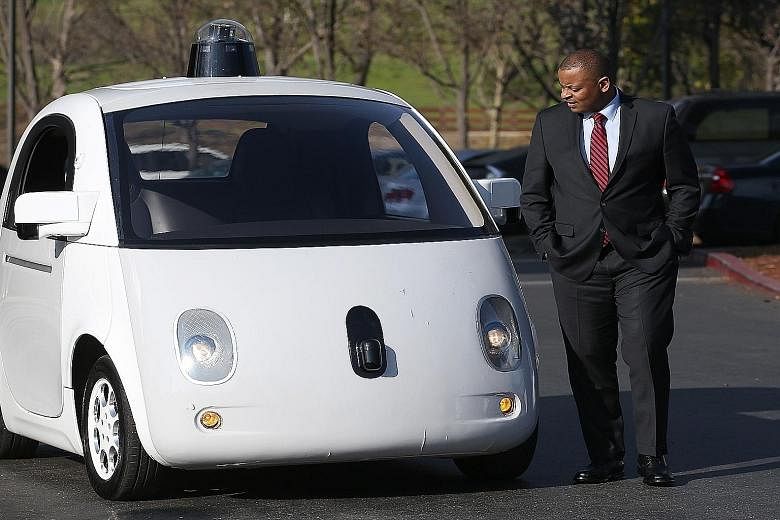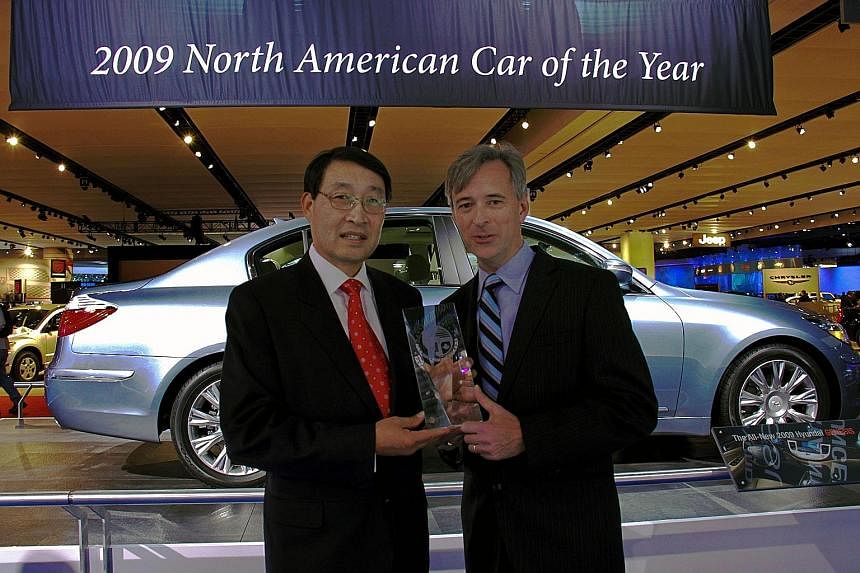Before Google introduced the prototype of its autonomous car - aka the "self-driving toaster" - to the public last year, the search-engine giant made the rounds of the major car-makers to explain the concept.
At least one of the car-makers was sufficiently impressed to express interest in collaborating, but was astounded to find that Google had no commercialisation plans of any kind for its potentially game-changing technology.
Ever since, the car industry has treated Google's vehicle like an uncomfortable joke: Though a source of real anxiety, the self- driving car seemed just unserious enough to laugh off.
Now, however, the nervous laughter may turn to real fear. On Monday, Google announced the hire of one of the most respected executives in the United States car industry: Mr John Krafcik, the former chief executive officer of Hyundai Motor America and president of the car-pricing website TrueCar.
With the car world's eyes transfixed on the glitzy-yet- conservative new products being unveiled this week at the Frankfurt Motor Show, Google is sending the strongest sign yet that the real action in the industry is increasingly found in Silicon Valley.
The industry journal of record, Automotive News, is calling Mr Krafcik's hire "the clearest sign yet of Google's broad commercial aspirations for the project".
Mr Krafcik has deep experience in nearly every aspect of the car industry, having studied lean manufacturing at the Massachusetts Institute of Technology, worked in production engineering at the Toyota-GM joint Nummi plant in California, worked as a product planner at Ford, led Hyundai America's leap from budget brand to mainstream player and focused on car retail at TrueCar.
Between Mr Krafcik, former Ford and Boeing CEO Alan Mulally (now a Google board member) and ex-GM research and development boss Lawrence Burns (now a Google Auto consultant), Google Auto is building a Dream Team to take on the century-old industry.
Just as important, Mr Krafcik, who drives a classic Lotus- designed Caterham Seven, brings some much-needed "car-guy" credibility to Google's programme. This may help to bring the enthusiast- dominated car media around on a project that seeks to create a permanent alternative to driving.
Meanwhile, Google seems deadly serious about doing exactly that, telling the California Public Utilities Commission that its vehicles will have no human controls beyond a "go button", a "please slow down and stop" button and a "stop pretty quickly" button.
According to Ms Sarah Hunter, head of policy at the GoogleX innovation lab, "the intention is that the passenger gets in the vehicle, says into a microphone, take me to Safeway, and the car does the entire journey". By removing driver input almost entirely, Google is enabled to re-imagine the car from the ground-up, potentially yielding a final product that is dramatically lighter, more efficient and yet safer than anything on the road today.
And with traffic deaths ticking upwards for the first time in decades, likely due to increasing driver distraction, Google's goal to cut the more than 30,000 vehicle-related fatalities each year gives it a sense of social mission that could put the car industry back on its heels.
As Google's threat becomes more credible, the traditional car-makers are circling the wagons: Last week, 10 car-makers announced a voluntary commitment to the National Highway Traffic Safety Administration and the Insurance Institute for Highway Safety to install automatic-braking systems as standard equipment in new cars.
The manufacturers' hope is that by offering some of Google's promised life-saving advantages with this incremental improvement, they can create a kind of Counter- Reformation that keeps buyers firmly in the driver's seat for years to come. Though details for this innovation are as sketchy as most of Google's announcements, it shows that the car industry is as serious about defending its evolutionary approach to the future of the car as Google is about creating a revolution.
With Mr Krafcik's hire, the industry can no longer afford to laugh off Google Auto as a mere science project.
Though Google says its car programme is not yet ready to become a standalone division under its new Alphabet rubric, it is now considering making private sales of its eventual car as well as operating them as a fleet for the sharing economy, potentially an even more direct threat to the traditional makers than previously anticipated.
And if Google does manufacture and sell its cars, it may well be in partnership with the giant car supplier firms that control an increasing amount of the car industry's value chain.
Most terrifying of all, newly granted patents show that Google is working on systems that allow an onboard computer to take control of a human-driven car, potentially putting the firm in direct competition with car-makers, even as it works to convince drivers to forgo a steering wheel entirely.
Unable to co-opt Google's technology and with their supply chain and talent pool under assault, the established car-makers' only response is to rush some semi- autonomous technology to market. If that fails to win buyers, then there is nothing left to do but hope that consumer preference for a traditional car experience wins the day.
With Mr Krafcik, Mr Mulally and Mr Burns behind the wheel at Google Auto, the threat from Silicon Valley has never been more real.
BLOOMBERG


